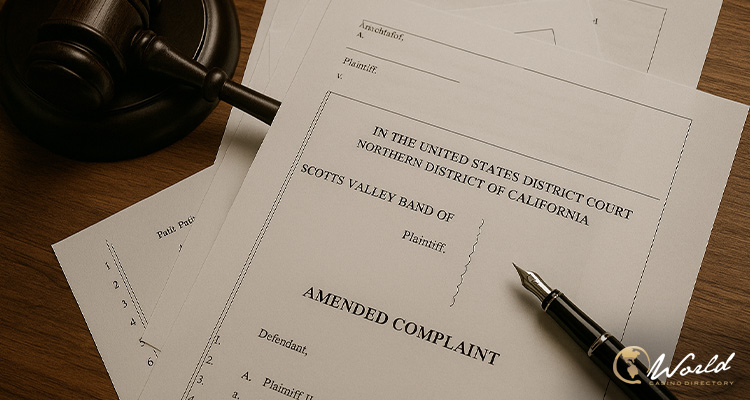The legal conflict over a proposed tribal casino project in Vallejo, California, has intensified as the Scotts Valley Band of Pomo Indians submitted an amended federal complaint, bolstered by internal government records. Filed in the U.S. District Court for the District of Columbia, the updated filing accuses the Department of the Interior (DOI) of yielding to political lobbying from rival tribal casino interests, rather than basing its March 2025 decision on new evidence or legal grounds.
Revised casino lawsuit points to alleged political interference:
According to the tribe’s revised complaint, documents released through the Certified Administrative Record on July 2 reveal that lobbyists for a competing casino project not only influenced the DOI’s decision-making but allegedly drafted internal memos and guided federal officials on how to rescind the earlier approval that had greenlit the Vallejo site for gaming development.
“The law and facts are absolutely on our side, so we are confident that the court will uphold our rights,” said Shawn Davis, chairman of the Scotts Valley Band. “We won’t be deterred from moving forward and building a better future for our Tribe and our neighbors in Vallejo.”
The lawsuit challenges the DOI’s reversal of its January 2025 determination, which had granted the Tribe the right to pursue gaming on its newly acquired trust land in Vallejo. That approval followed years of litigation and affirmed that the site met the criteria of “restored lands” under the Indian Gaming Regulatory Act. Just under three months later, however, the DOI reopened its review, citing submissions from rival tribes.
The planned development in Vallejo spans 160 acres near the junction of Interstate 80 and Highway 37. It would feature a 400,000-square-foot casino open 24/7, as well as housing, a tribal office, a parking structure, and a preserved ecological zone. The estimated $700 million project is anticipated to generate thousands of jobs and significant wage contributions through construction and permanent operations.
Support for the development has been mixed among Vallejo residents. Some, including former local business owners, see it as a promising boost to the regional economy. Others have voiced apprehension about potential community disruption. Local officials, however, have clarified that they hold no jurisdiction over federal land trust decisions.
Earlier in June, the court affirmed that the tribe’s Vallejo property remains in trust, denying a preliminary injunction but allowing the case to move swiftly forward. “We are very confident in the strength of our legal position,” said Davis. “The Court’s order allows the case to move forward quickly, and we are fully prepared to defend the integrity of the Department’s original decision.”
Meanwhile, opposing tribes such as the Yocha Dehe Wintun Nation maintain that the DOI’s reconsideration process is justified. According to the Times-Herald, Chairman Anthony Roberts stated, “The courts have endorsed the Department of the Interior’s reconsideration process,” and dismissed the latest claims as “an attempted distraction.” Roberts added, “Vallejo is Patwin territory, and it always has been.”
Though rival tribes had submitted historical claims during earlier reviews, the DOI initially sided with Scotts Valley. The March reversal was followed by separate lawsuits from the United Auburn Indian Community and Yocha Dehe, which were denied standing in the ongoing litigation. As it stands, the court’s review now centers on whether a fully vetted agency decision can be reversed without restarting the entire judicial process.
A larger debate around tribal sovereignty and gaming expansion:
The legal clash arrives at a time when the casino industry is undergoing significant shifts. The growing popularity of online casinos—many now offering payment methods like Cash App—has reshaped player behavior and market competition. Experts note that while physical casinos face growing challenges from digital platforms, large-scale projects like the Vallejo proposal remain crucial for tribal economic self-reliance and job creation.
The tribe argues that its land trust status and gaming eligibility were achieved through proper legal channels and that the DOI’s sudden reversal, allegedly prompted by external lobbying, threatens tribal sovereignty and investment stability. Should the court rule in Scotts Valley’s favor, it would restore the January 2025 approval and clear the way for final permitting.
The outcome will also help clarify the scope of federal authority in reversing finalized agency decisions concerning tribal rights. Observers expect expert witnesses to weigh in on legal, archaeological, and historical matters, with key precedents from the 2022 and January 2025 court orders set to play a central role.
The case, Scotts Valley Band of Pomo Indians v. Douglas Burgum, et al., is being heard in the U.S. District Court for the District of Columbia under Case No. 1:25‑cv‑00958. Early-stage briefing is in progress, with hearing dates yet to be scheduled.



